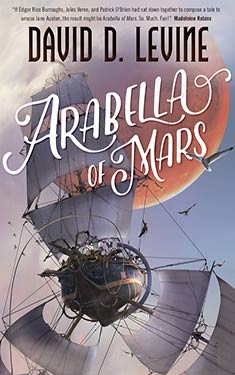David D.
Levine
Completed 11/06/2018,
Reviewed 11/06/2018
3 stars
This was a
fun little novel with regency era and steampunk flavoring. It harkens back to older science fiction
where there is air in space between the planets and space travel is
accomplished with boats that can sail the interplanetary distances in relatively
short amounts of time. Mars has a
British colony, not unlike India where the Brits own and cultivate the land and
the native Martians are relegated to servant and nanny positions. And the Napoleonic Wars occur in space as
well as on Earth. The book is pretty
well written, but this is basically a fluff novel with little substance.
 The year is
1813 and sixteen-year-old Arabella lives on Mars on her father’s
plantation. After playing on the Martian
plains in her Martian trousers, Arabella sustains a slight head injury. Her mother takes extreme issue with the way
she is not being brought up as a proper young English lady should and brings
her and her sisters back to Earth. While
on Earth, her father back on Mars dies suddenly, leaving her beloved brother Michael
to run the family business. She is sent
to a cousin’s house to grieve. Her
cousin Simon gets a wild idea to murder Michael to steal the inheritance. To stop Simon, she poses as a boy and gets a
job as an airman aboard the Diana
bound for Mars. Can she hide her gender
among these rough and tumble airmen long enough to make it back to Mars and
save her brother?
The year is
1813 and sixteen-year-old Arabella lives on Mars on her father’s
plantation. After playing on the Martian
plains in her Martian trousers, Arabella sustains a slight head injury. Her mother takes extreme issue with the way
she is not being brought up as a proper young English lady should and brings
her and her sisters back to Earth. While
on Earth, her father back on Mars dies suddenly, leaving her beloved brother Michael
to run the family business. She is sent
to a cousin’s house to grieve. Her
cousin Simon gets a wild idea to murder Michael to steal the inheritance. To stop Simon, she poses as a boy and gets a
job as an airman aboard the Diana
bound for Mars. Can she hide her gender
among these rough and tumble airmen long enough to make it back to Mars and
save her brother?
There are
some spoilers in this paragraph, so be forewarned. Arabella is a good character, but a bit of a
Mary Sue, that is, an idealized and seemingly perfect fictional character. She’s a tomboy, the only girl breaking out of
the English lady mold that all the other woman are stuck in. She’s smart, creative, adventurous, and
understands the inner workings of automatons, which is a hobby of her father. It’s that knowledge of automatons that gets
her the job on the Diana. Even though times are tough, everything she
touches seems to turn to gold, even single-handedly stopping a mutiny. She seems to constantly save the day. It requires a lot of willing suspension of
disbelief that one person can have so much good luck. It gets to the point where you just know that
everything is going to work out in the end one way or another, and that was a
little disappointing. She doesn’t have
much of a growth arc, but I still liked her.
The plot itself
is pretty good as well. The time on Mars
and on Earth were interesting and often exciting. My biggest complaint was that I thought much
of her time aboard the Diana was
boring. It is filled with details of
ship sailing that might excite other people, but didn’t excite me. A lot of it felt like filler. Fortunately, it was easy reading. I am guessing that it harkened back to the
pre-SF adventure novels which featured sailing to exotic locations.
I give this
book three stars out of five. It’s good,
but nothing groundbreaking. The trope of
women hiding as men has been done a lot as has the counter-cultural woman in
the 19th century. Still, the
book was basically fun, with a simple but exciting ending. It was easy to guess what was going to happen
in the end. I’d recommend the book as a
light, fluff read.
No comments:
Post a Comment